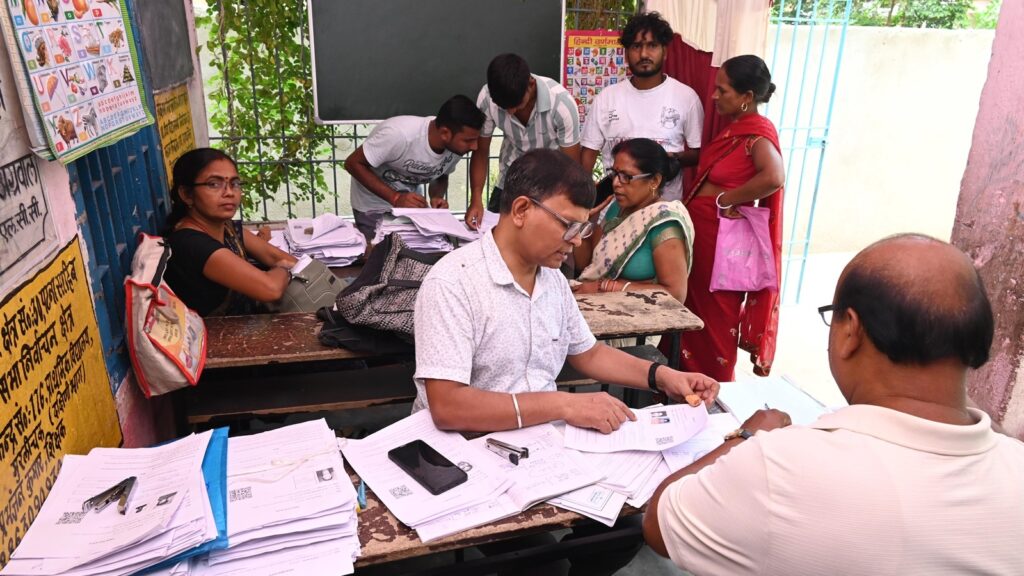PatnaAug 18, 2025 07:14 IST
First published on: Aug 18, 2025 at 07:11 IST
By July 25, when the first phase of Bihar’s Special Intensive Revision (SIR) came to a close, not more than 15-20 per cent of the state’s eligible voters had attached any of the EC-mandated 11 documents to establish their identity. As volunteers now scramble to help people get the documents, and with merely two weeks to go before the September 1 deadline, several district administrations have found a way around the problem – the “parivarik suchi” or family tree as an informal “12th document”.
According to several Booth Level Officers (BLOs) The Indian Express spoke to, electoral officers in all 38 Bihar districts have been reportedly asked to consider the family tree of a voter and establish her/his closest link to the 2003 list.
“We were told at a district sub-division meeting that for those without any of the 11 EC-mandated documents, we can find a way to draw up a family tree linking them to their parents or grandparents in the 2003 electoral roll. Even if a grandparent or uncle is on the 2003 list and the voter can draw up a family list linking himself to this relative, we consider it as his identity document,” says a BLO, a 54-year-old teacher, in Muzaffarpur.
This workaround, say BLOs, has pushed up compliance in several booths. “Since most voters in the village are below 38 and have not studied till Class 10, this 12th document is working like magic. It’s our Rambaan (trump card). Our document-compliance percentage has shot up from 60 to 76 per cent in just five days,” says the BLO.
Until now, those not on the 2003 voter list had to furnish proof of their own identity along with that of their parents using any of the 11 EC-mandated documents. If either of their parents is on the 2003 list, they had to submit proof of their identity along with a screenshot of the parent’s name on the 2003 list. With Aadhaar not among the 11 approved documents, it was the identity proof that was proving to be the stumbling block. BLO and volunteers, who are tasked with helping people get the documents needed to make it to the final draft rolls, hope the “parivarik suchi” or the “12th document” could be the answer they were looking for.
“Our seniors did not give us any written instruction or format. But we worked it out,” says the 54-year-old BLO, showing a printout titled ‘parivarik suchi’.
He explains, “If, for instance, an applicant is not on the 2003 voter list and has none of the 11 documents – domicile or birth certificates, Class 10 certificate etc – but, say, his grandparents are on the list, he has to give their details (names, polling booth numbers), and names of all their children and grandchildren above 18 years of age, right up to this applicant whose name should be highlighted. If the relative on the 2003 list is alive, she/he will sign the form, and if dead, the form will mention that. The BLO and the BLO supervisor then sign this form and upload it as the applicant’s identity proof. But this is not the standard format; BLOs can come up with their own formats.”
While the ‘12th document’ has come as a relief, it hasn’t ironed out all problems or made the process easier for all. For one, voters still have to go through a cumbersome process of finding out the booth number where their parents voted (if their names figure on the 2003 list) and match it with the records. The process is especially difficult for those who may have moved homes and for women.
“About half the voters in my list are women. About 60 per cent of them are not part of the 2003 voter list and have to give an identity proof for both themselves and their parents. In a lot of cases, the women may have left their maternal homes decades ago. Even for those whose parents were on the 2003 list, how will they come up with identity proofs for the parents? It’s very difficult. Can’t they let women use the parivarik suchi and establish links with their parents-in-law or other senior relatives on their in-laws’ side?,” wonders the BLO as he is interrupted by a colleague from a neighbouring booth.
“It is not allowed because in several border districts, the daughter-in-law of the family is from Nepal. This way, several Nepali citizens married to Indian voters will become voters here,” says the colleague.




